A battle for America's soul
- Published
- comments
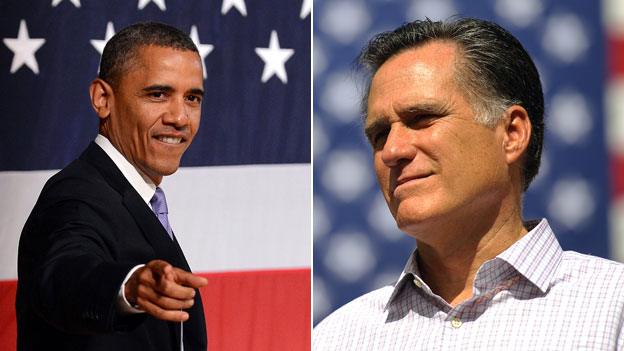
When Barack Obama was elected, I lived in Belgium.
Something extraordinary happened around the corner from my home. A favourite local cafe hung out a stars and stripes.
Looking back from this land where houses, hats and hustings are always draped in the red, white and blue, that sounds commonplace. But it wasn't.
In my four years as the BBC's Europe editor, travelling to most of the 27 countries that make up the European Union and many outside it, I never saw the American flag displayed apart from at embassies or Kosovo, where Americans were indeed held in high esteem.
Elsewhere, many considered the US a rogue nation, a bully and a bigot, George W Bush the symbol of its excess.
The wave of sympathy that engulfed the world after 9/11 had drained away into the sand of Iraq.
The election of the country's first black president was seen as a moment of huge hope, holding the possibility of great change.
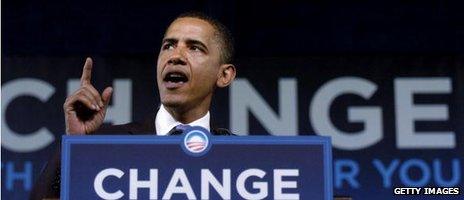
It was then a surprise to arrive with my family to take up the new job and find a very different mood had seized some Americans.
Taking a brief holiday travelling down the coast through Virginia, North and South Carolina, discovering the delights of BBQ and the easy languid grace of the south, it was a shock to switch on the TV in hotel room after hotel room to find pictures of over-heated town hall meetings, with people denouncing Mr Obama as though he were a war criminal, not hope made flesh.
It was a reminder that the idea he had an overwhelming mandate was conjured by the enthusiasm of the world and supporters at home. There are two Americas and only one voted for him.
A lot of time in my first two years was spent trying to understand what lay behind the anger that I had seen on TV. They are the ones who revitalised their party and made it possible for Mitt Romney to be so close to the White House.
I talked to people at small Tea Party gatherings in the parks of little towns and at huge rallies in the shadow of the Capitol.
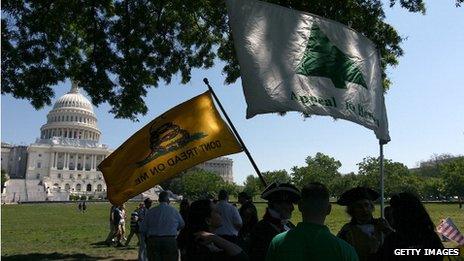
I chatted at convivial gatherings over coffee and homemade cake, did interviews at serious study groups which seemed like the constitutional equivalent of Bible meetings.
I've met many who told me they didn't understand how much trouble America was in until they retired and had time to watch Fox News.
I've met very well-informed people who are worried sick about America's debt and direction. I've met a fair few daft ones, too, like the woman who told me Mr Obama wanted to introduce Tsars "like they have in communist countries".
Beyond a fairly conventional conservative concern about taxation and debt, there is an inchoate angst that their country is going in the wrong direction, that they need to "take it back".
Some think this is code for "take it back from the black man in the White House".
It is not that simple. Nearly all of the people I met were white and most middle-aged or older. But few were racist in the conventional sense.
The only time I have seen that in the raw, I was off duty, at a dinner party. A woman growing increasingly passionate as the wine flowed called Obama a "monkey" and said "he's trying to give OUR money to THEM".
Not the poor, not the shiftless, "them".
"They" are part of a different America, with a different history who want a different path for their country.
A millionaire in a designer chair in his plush Chicago home, surrounded by modern art, makes the same point as the broken-toothed men perched on smashed-up office furniture outside a beat-up shotgun house in Texas.
Next to me in the pew of a Florida church, the man with a trim grey beard and a "veterans for Obama badge" tells me the same thing.
These very different people all had one thing in common. They're black. And that means they share a history and often they also share a perception of the present.
Black Americans up and down this huge country tell me Mr Obama didn't create this mess, and he needs time to clear it up.
They know all about patience. They know all about clearing up other people's mess. They know about being shut out of this country's narrative.
There's a black history month. It rather implies that for the other 11 months, it is white history that will have its way. With Mr Obama they feel that has changed, just a little.
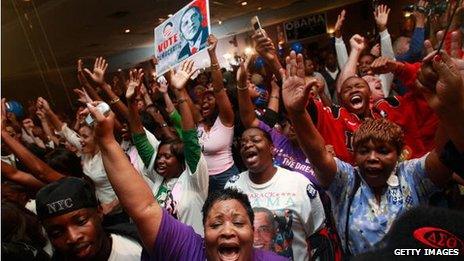
Obama's election in 2008 sparked celebrations among many African Americans
When a passionate Tea Party member talks about the land of opportunity, where people came to forge a better future, free from the persecution and tyranny of the old world, he rarely reflects that some Americans can't quite see it like that.
Their ancestors were reluctant immigrants from a better past, dragged in chains towards a land of persecution and tyranny.
If they do raise their voices, that is seen as having a chip on their shoulders.
One respected commentator told me a test of my time here was whether "they" would "get over it". Blacks have got poorer, worse off under Mr Obama. But for many, his election was a large step forward in a long march that is far from over.
There are other histories too. In a patrol car, bumping along a dirt track running alongside a giant fence, I reflected on the difficulty of keeping out immigrants who want to be part of the dream.
The fence of railway girders and wire just gives out, stops, as if in exasperation at the immensity of its task.
Latinos here legally are a growing part of the second America. They will make up 29% of the population by the middle of the century.
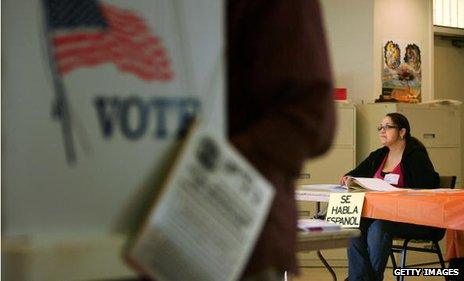
Watching Democrats campaign door to door for Mr Obama in Colorado, I was struck by something strange.
Many of the people canvassed looked Latino, spoke English with a distinctive accent but spoke no Spanish. As one of the canvassers put it to me: "We didn't cross the border. The border crossed us."
It is true. Until the 19th Century, vast parts of the south west of the US used to be Mexico. Those people too are Americans.
Mr Obama and Mr Romney both continually stress that they offer a very different vision of America's future.
You could say that they both have a vested interest in dressing up the musty policy differences that have been at the heart of politics for 100 years, to make them appear more heroic.
But that might be to miss the point that in America, politicians have never made a grand bargain or accepted the mish-mash of compromise about the role of the state that is the stuff of post-war politics in Britain and Europe.
The two men do see two visions - two different mirages of a future America, shimmering hazily on the horizon. But the trouble is there really are two Americas existing now. And the gulf between them is getting wider.
Increasingly, what you believe reflects who you are. The alliance of city dwellers and better-off liberals, Hispanics, blacks, many younger people and significantly more women may or may not win this time - but they are the Democratic core.
They largely agree with both Mr Obama and Bruce Springsteen's bitter, brilliant anthem that America should "take care of its own" and that a government of the people should not be despised by the people.
But the change Obama is offering would make the US more like the rest of the West, even as Europe's future looks dim.
He's trying to tame his country's demons when many see ornery cussedness as a founding virtue.
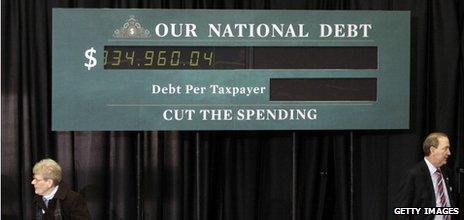
Republican strength is made up of an alliance too, overwhelmingly white, the well-off, evangelical Christians and much of what used to be the working class, the rural, the blue collar and the deep south.
But here's an uncomfortable truth, difficult to state - this hinterland of conservatism does embody what they and many in the world consider especially American virtues and strengths and, yes, flaws.
The dogged individualism that is fiercely critical of the extent to which the state helps those in need, but glories in kicking butt abroad. They take care of their own, but they do it themselves and circumscribe whom that includes.
They have the sort of determined guts and belief in a dynamic and manifest destiny that is needed to force the desert to bloom with shopping malls and new suburbs.
They see themselves as descendants of pioneers who forged a brash city standing proud on a barren hill.
These romantic ghosts will not easily be blown away on winds from a future world.
The two Americas are not immutable. They will slip and merge into each other.
America is such a very young, dynamic country - as were we across the Atlantic when presumably the Angles hated the Saxons and never thought they would be known by one name.
But for now this is not good.
Whichever America wins on Tuesday the losers will not happily tread the path chosen by the other America.
The BBC will be providing full online live results of the US presidential election on 6 November. More details here